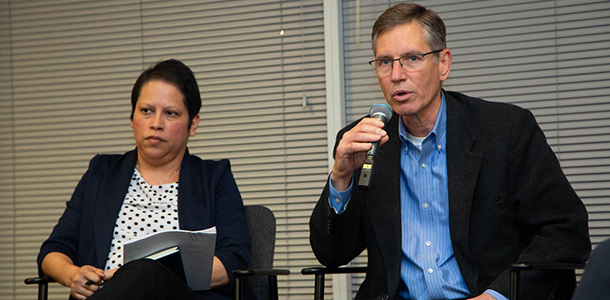
CA Fwd President and CEO Jim Mayer and vice president of the Center for Education Excellence & Talent Development for the L.A. Area Chamber (Photo: Joanna Kim/California Immigrant Policy Center)
Is Trump’s immigration crackdown killing the California dream?
That question set off an interesting conversation in Los Angeles recently hosted by the California Immigrant Policy Center and the publication Capital & Main.
The state is already facing the economic threat of economic inequality—with some 18 million Californians living in or near poverty.
And the consensus was the immigration “crackdown” is worsening it.
University of Southern California Professor Manuel Pastor pointed out that in Los Angeles County many of the undocumented are deeply rooted, what he called “settled immigrants” having been here more than a decade.
He noted that there are 900,000 undocumented Angelenos living with 800,000 American-born family members.
“Every deportation,” he said,” disrupts a family, a business and the community.”
State Senator María Elena Durazo (D-Los Angeles)—an iconic labor leader elected in 2018—said that the crackdown is “creating even more fear than we expected.”
California, she said, “plays a critical role in standing up to this. We are disobeying Donald Trump and we are being successful.”
For Dr. Alma Salazar—who oversees education and workforce policy for the Los Angeles Area Chamber of Commerce—the crackdown is an important business issue.
“The business community of Los Angeles understands the economic benefit of our immigrant communities,” she said.
The agriculture industry is suffering a farm worker shortage and the travel and tourism industries have been hard hit by the Trump policies.
“Young adults are questioning whether to apply for graduate school for fear of exposing a family member who is undocumented. What will that do to our workforce pipeline?” Dr. Salazar asked.
CA Fwd’s Jim Mayer pointed out that the California Economic Summit has been working for years to sharpen the focus on workforce and economic development programs to alleviate income inequality.
“More than four million Californians—many of them immigrants—are not making a livable wage,” he said. “We can and must do better.”
Mayer said many of the Summit’s regional and community partners are working to engage under-skilled residents—including undocumented immigrants—and connect them to the training and support that will enable them to participate more fully in the economy. In addition to resisting federal efforts, Mayer said these communities are doubling down on inclusive strategies to increase resiliency.
Compounding the increased deportations, the Trump Administration is “slow walking” the citizenship process. According to Professor Pastor, it is taking from 18 to 20 months to become a citizen and the number of people who have applied but not yet been granted citizenship has more than doubled since Trump took office.
The economic effect of those delays cannot be ignored. When a person gains citizenship there’s an 8-11% gain in wages, Pastor said.
“The act of resistance in a democratic context means not just having the power to organize and express our outrage and aspirations. It is also creating opportunities for people to imagine the perspectives and challenges of others,” said Cynthia Buiza, executive director of the California Immigrant Policy Center. “Done right, I hope it could also take us to a place where we realize we have more in common with each other than we have differences.”
The question-and-answer period turned inevitably to 2020 presidential election. CA Fwd’s Mayer was asked what criteria should be used to assess the next group of candidates.
“I would start with how they speak about the dignity of other human beings,” he replied.
The audience agreed.

